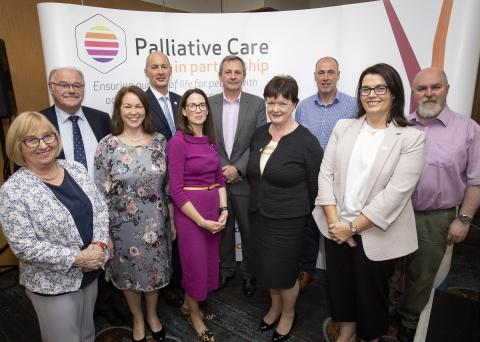Palliative Care in Partnership: From Policy to Practice

To mark this year’s Palliative Care Week [Sunday 8 to Saturday 14 September] the Palliative Care in Partnership programme held a conference to showcase progress made to date on improving the experiences of people with palliative care needs and those important to them, and to set out priorities for the years ahead to continue to enhance and improve these services.
Corrina Grimes, Palliative Care lead at the PHA, said: “Due to improvements in public health, people are thankfully living longer and are less likely to die suddenly. We are seeing more people die from illnesses such as dementia, frailty, cancer or other progressive diseases and they could be benefitting from a palliative care approach in the last phase of their lives.
“Palliative care ensures that a person with a serious and/or progressive condition, regardless of age or condition, can have the best possible quality of life. It may be appropriate for a number of years, not just the weeks and days at the end of life. People with palliative care needs can be supported by the whole community, including primary care, hospices, hospitals and nursing homes. A more positive experience will occur when decisions around palliative care involve the person and those close to them.
“The main aim of the Palliative Care in Partnership programme* is to ensure that ‘what matters to me’ is addressed for each person with palliative care needs, whether the need is physical, psychological, social or spiritual, or a combination of these, as is often the case, and that these needs are identified early. In order to do this we want people to have a better understanding of palliative care, so if the need arises for them or someone close to them to consider it, they will feel able to discuss it with their loved ones and health professionals.”
The conference provided an opportunity to look back at the key successes from the programme’s development such as identifying those in need of palliative care, increasing access to services and the coordination of care. The conference also highlighted the importance of planning for the future with the launch of the ‘Heart of Living and Dying’ facilitators’ guide.
Corrina concluded: “We want to get as many people as possible thinking, talking and acting during Palliative Care Week.
“Talking about dying, death and bereavement is in everyone’s interests as it can help ensure that all of us can get the care and support we want, and where we want it, at the end of our lives. The ‘Heart of living and Dying’ will be one great example of how people can become involved.
“Even just having a chat with family, friends or colleagues about the importance of preparing for death can change perceptions. Through being more confident in talking about dying and taking small actions to plan for the future and support each other, together we can make a big difference. Talking about death does not bring it any closer. It is about planning for life.”
Richard Pengelly, Permanent Secretary at the Department of Health, said: “I am pleased once again to support Palliative Care Week. Our health and social care professionals play a valuable role in helping people with palliative care needs receive the care and support they need to live well and have the best possible quality of life. At a community and individual level, we also have a role to play. Being part of the wider conversation to raise awareness and understanding of palliative care and address the misconceptions that many people hold about this is something we can all contribute to. At an individual level, having conversations with our loved ones about their, and our own, preferences for care and planning ahead for this can help provide reassurance that, if the time does come when it is needed, our preferences and wishes for future care are known and can be acted upon.”
